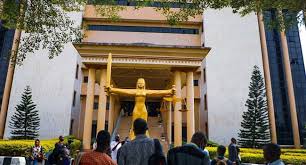The Judiciary Staff Union of Nigeria (JUSUN) began an indefinite nationwide strike on Monday, June 2, with its Federal High Court chapter enforcing a total lockdown of court premises, denying access to judges, lawyers, staff, litigants, and the general public.
The industrial action follows the union’s national directive, protesting the federal government’s failure to implement a salary adjustment based on the newly proposed minimum wage of ₦70,000 and to pay outstanding wage awards.
At the Federal High Court headquarters along Shehu Shagari Way in Abuja, all entrance gates to the multi-storey building were locked. Similar scenes played out at the Court of Appeal and the FCT High Court in Maitama, where a banner reading “JUSUN on Strike” was prominently displayed at the gate.
In a circular issued on May 30, JUSUN’s acting national secretary, M.J. Akwashiki, instructed chapter chairpersons to direct members to commence the strike from midnight on Sunday, June 1.
“This directive follows unfruitful meetings convened by the Minister of Labour and Employment in an attempt to mediate the dispute,” the statement read. “In line with the decisions of our National Working Committee (NWC) and National Executive Council (NEC), the strike will continue until further notice.”
JUSUN is demanding the payment of five months’ wage awards, full implementation of the ₦70,000 minimum wage, and enforcement of a 25% and 35% salary increment structure.
The strike action commenced despite an appeal by the Chief Justice of Nigeria, Justice Kudirat Kekere-Ekun, urging the union to suspend the strike to allow for continued negotiations with the federal government.
Meanwhile, judiciary workers under the National Judicial Council (NJC) and the Supreme Court are not participating in the strike. Their premises remain open, consistent with prior statements from JUSUN spokesperson Joel Ebiloma and Danladi Nda, chairman of the Supreme Court chapter of the union.




